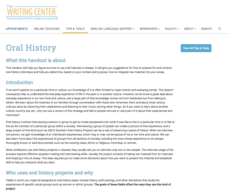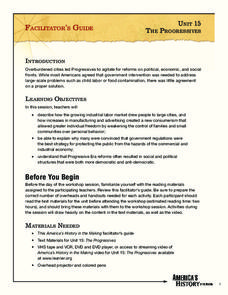Mr. Nussbaum
Abraham Lincoln Reading Comprehension—The Presidential Years (Part 1)
Hail to the Chief! Your class learns about Abraham Lincoln winning presidency and choosing cabinet advisors through a reading passage and paired multiple choice questions. The resource offers great practice for state tests and...
University of North Carolina
Oral History
There's no better way to learn something than to hear it straight from the horse's mouth. A handout on oral history, part of a larger series on specific writing assignments, explains how to conduct interviews and use the information...
Annenberg Foundation
The Progressives
The Progressive Era brought about a word that often leads to turmoil—change! Learners research the late 1800s in American history to uncover societal issues gripping the nation back in the day. The 15th lesson of a 22-part series...
State Bar of Texas
Worcester v. Georgia
Can the president of the United States defy the rulings of the Supreme Court? Students investigate the case of Worcester v. Georgia and the impact it had on society and, most importantly, Native Americans. Using a short video clip as...
State Bar of Texas
Sweatt v. Painter
Is separate but equal actually equal? The 1950 Supreme Court case Sweatt v. Painter discusses the law of segregation and inequality. Scholars investigate the impact of the case on the desegregation of public schools across the nation...
State Bar of Texas
Baker v. Carr
Can the federal government override the state government to protect the citizens of the United States? The 1962 Supreme Court case Baker v. Carr outlines the issue of equal protection under the law. Scholars investigate with a short...
State Bar of Texas
Wisconsin v. Yoder
How far does freedom of religion truly go? The 1972 Supreme Court case Wisconsin v. Yoder introduces the concept of the free exercise clause of the First Amendment. Individuals examine the case with a short video and open discussion. To...
State Bar of Texas
Roe v. Wade
At what point does the right of privacy end and the government begin? Scholars research rights under the Ninth Amendment to the Constitution. Using the 1973 Roe v. Wade Supreme Court case as a starting point, along with small group work...
State Bar of Texas
White v. Regester
One vote doesn't really matter, right? Class members investigate the concept of voter rights and restrictions using the 1973 Supreme Court case White v. Regester. They view a short video and work in pairs to analyze how people create...
State Bar of Texas
Texas v. Johnson
If you saw a person burning an American flag, how would you feel? Scholars analyze the concept of freedom of expression and speech with the Supreme Court case Texas v. Johnson. A short video clip creates open discussion in pairs on the...
State Bar of Texas
Edgewood ISD v. Kirby
Have you ever wondered where the money comes from to pay for your school, teachers, supplies, and building? The 1989 Supreme Court case Edgewood ISD v. Kirby lays a framework for open discussion on the funding of public schools. Using a...
State Bar of Texas
Grutter v. Bollinger
A university decides not to allow a qualified scholar to enter its institution based on skin and gender—but this case is about a white female? The 2003 Supreme Court case Grutter v. Bollinger lays the foundation for open discussion and...
California Education Partners
Quest for Tree Kangaroo
A three-day assessment challenges scholars to read a passage from an informational text then complete two activities that lead to a writing assignment. Day one and two begin as readers independently read a passage and tag the most...
Scholastic
The First Thanksgiving Feast for Grades 3-5
Scholars examine the first Thanksgiving through books and interviews while they complete a KWL chart. Pretending they are part of the feast, learners craft a scrapbook page that features images related to their experience. Pupils reflect...
Readington Township Public Schools
Facts Practice Using Multiplication/Division Fact Triangles
Why waste time teaching multiplication and division facts separately, when this resource allows you to cover both concepts at once. Displaying the fact families for all single-digit factors, these triangle shaped flash cards are a great...
K12 Reader
Two Viewpoints of the Same Event: Lee Surrenders to Grant, 1865
How did Union General Ulysses S. Grant view the surrender of Confederate General Robert E. Lee in 1865, which effectively ended the United States Civil War? After reading an excerpt from Grant's autobiography, your young historians will...















